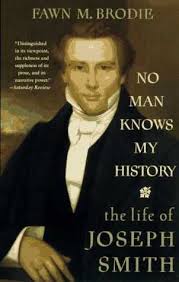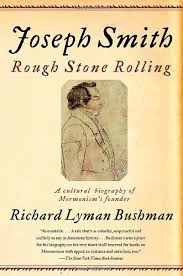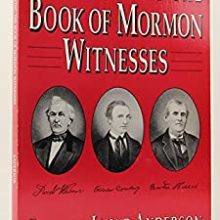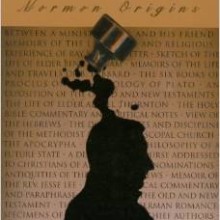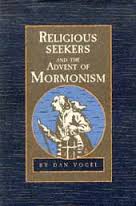This is the second edition of Fawn M. Brodie’s classic 1945 biography of the Mormon prophet Joseph Smith. Brodie is well-known for her other highly respected biographies on Thomas Jefferson, Richard Nixon, Sir Richard F. Burton, and Thaddeus Stevens. The book is a detailed dispassionate factual narration of Joseph Smith’s life and the early days of the Mormon Church until his murder by a lynch mob at age 39 in 1844.
While Brodie is careful not to disparage Joseph Smith, she presents him as a human with normal inclinations and faults, and Mormons might not like to think of him in this way. In fact, the Mormon Church excommunicated her because of this book. She writes that the “major original premises of this biography was that Joseph Smith’s assumption of the role of a religious prophet was an evolutionary process, that he began as a bucolic scryer, using the primitive techniques of the folklore of magic common to his area, most of which he discarded as he evolved into a preacher-prophet.”
Brodie offers evidence showing that Joseph Smith began his career offering to help gullible farmers find buried fortunes on their land. He originally intended to compose a fictional novel about buried treasures but then altered it into a true account of a revelation delivered to him on golden plates in a foreign language with tools to translate them. Brodie discusses the belief that much of this Book of Mormon was plagiarized from another person’s novel. Joseph Smith claimed that he had his first vision of God and Jesus, who had human forms because God was once human, in 1820 when he was fourteen. Brodie shows that this dating is “sheer invention… he dictated at least three different descriptions of the `first vision’ between 1831 or 1832 and 1839, and these descriptions differ strikingly in detail.” The revelation states that American Indians descended from Israel’s “Ten Lost Tribes” who sailed to America around 600 BCE. (Actually, the ten tribes were driven out of Israel in 722 BCE.)
The Book of Mormon disparages all people of color, although Indians are better than blacks. Women are also belittled. Their role both in life and in the after-life is to care for their husbands. A wife cannot enter the after-life unless her husband allows her entry.
Joseph Smith called his new religion Mormon saying that the word is Egyptian and means “good.” But he didn’t know Egyptian. Brodie describes a trick pulled on him where he was told that a document apparently contained Egyptian writing, and he was asked to translate it. Smith didn’t know that the person was an Egyptian scholar and gave a totally wrong imaginative translation. He later called his church the Church of Jesus Christ of Latter Day Saints.
Shortly before his murder, Smith and some of his saints began to practice polygamy, while publically insisting that the practice was wrong. Brodie names and describes over forty women that he married. Over a dozen were married to other men and their husbands apparently knew nothing of the liaisons. These included five pairs of sisters and one mother and daughter. Some women whom he approached turned him down. His wife was opposed to polygamy and claimed that he never engaged in it. She married a non-Mormon after his death.
Smith was charismatic and able to draw thousands of people to his new religion. Because of repeated vicious persecutions, he had to lead his saints to Ohio, Missouri, and Illinois. He was imprisoned for treason when the lynch mob stormed his jail cell and murdered him.
